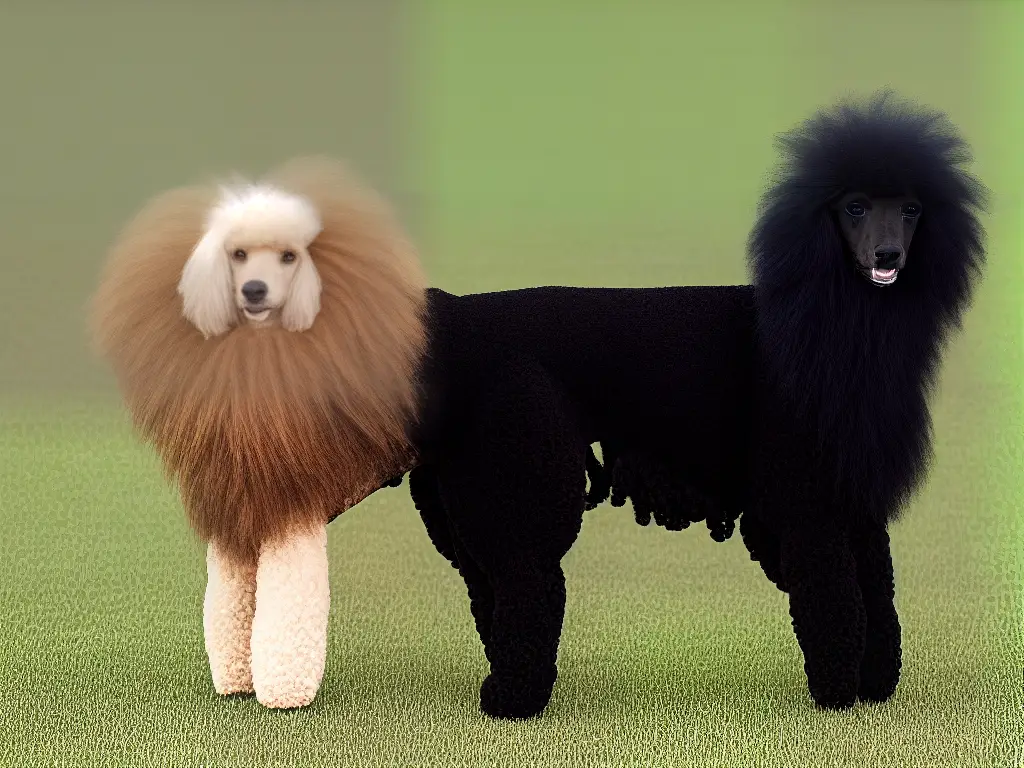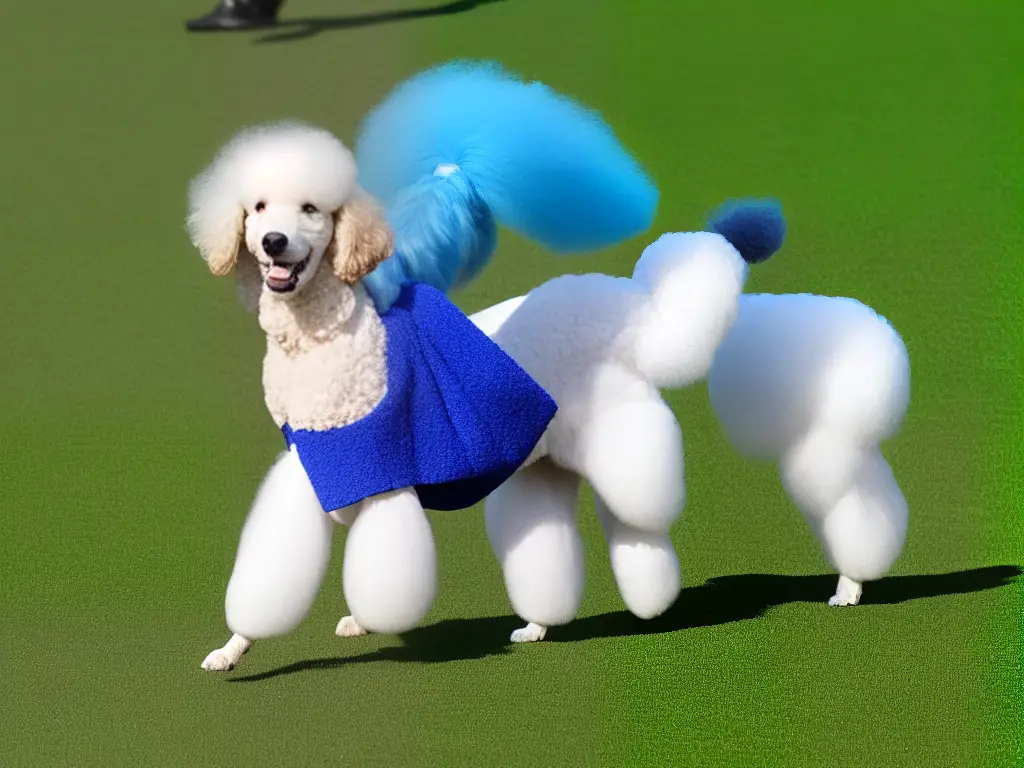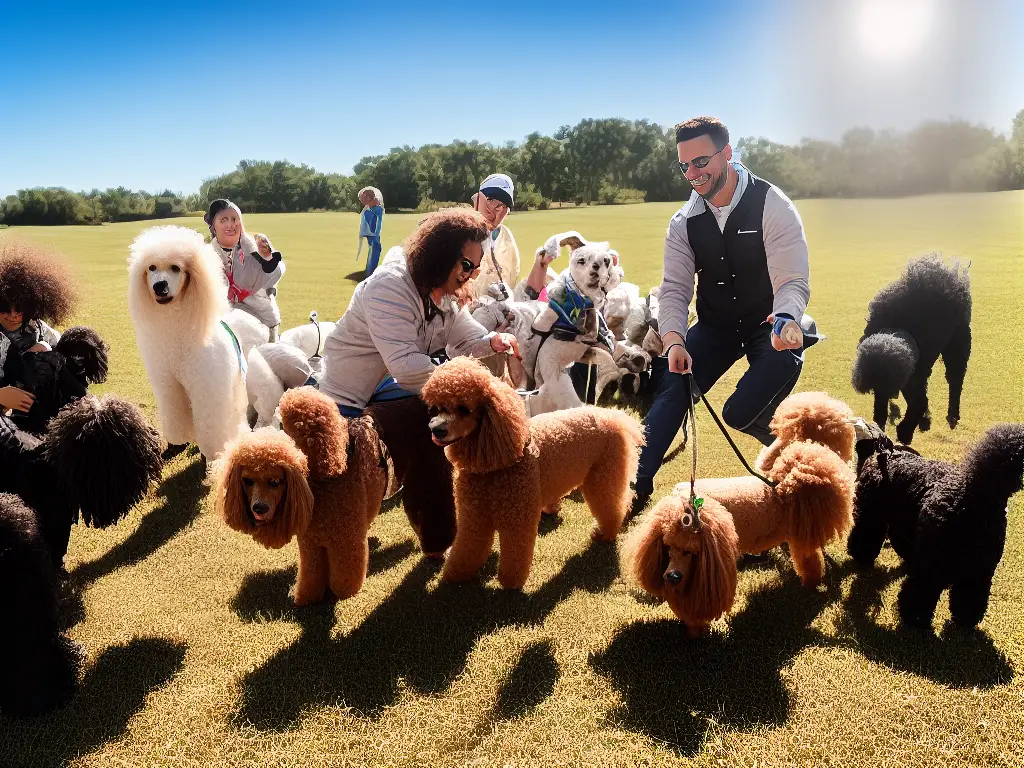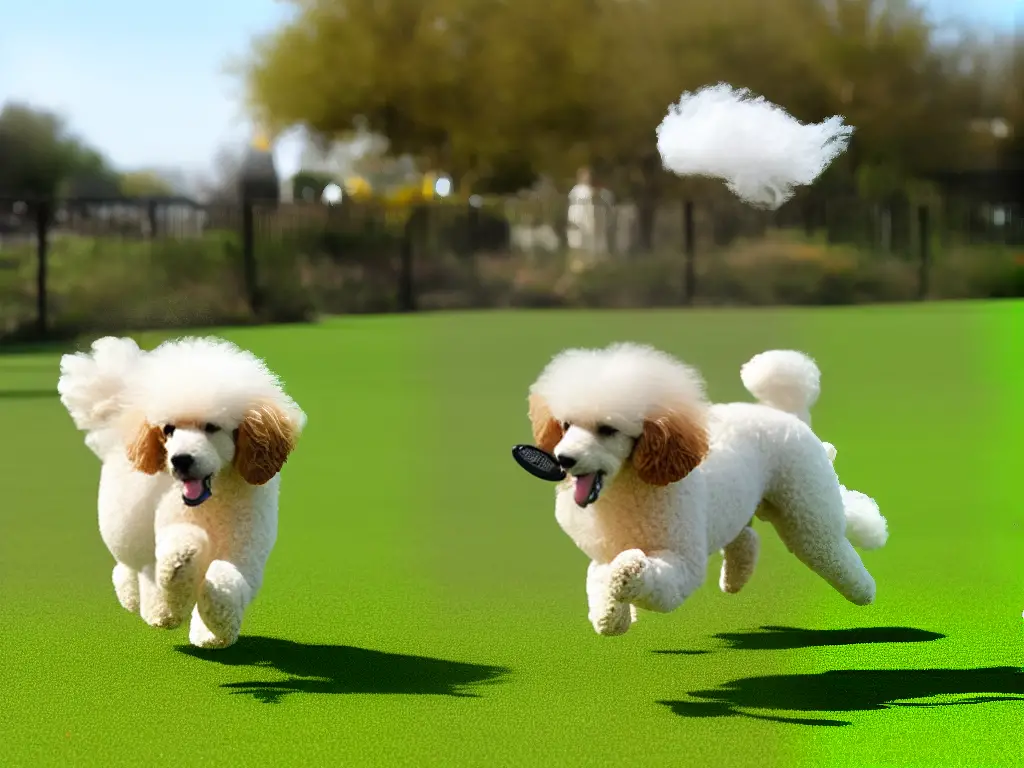Poodle Temperament
The poodle is a highly intelligent, sensitive, and adaptable breed, known for its distinctive curly coat and elegant appearance. Often associated with luxury and sophistication, poodles are beloved across the globe for their remarkable ability to form strong bonds with their owners, showcasing their loyalty and affection. This essay intends to provide a comprehensive understanding of the poodle temperament, covering various aspects such as their breed history, intelligence, socialization, training, energy levels, sensitivity, affection, guarding tendencies, and interaction with children and other pets.
Poodle Breed History
The Poodle breed is believed to have originated in Germany, where they were called “Pudelhund,” a name that referenced their water abilities. The breed was later standardized in France, where it became the country’s national dog, often referred to as “Caniche.” Historically, Poodles were bred for various tasks, such as herding livestock, as well as waterfowl hunting, which is a primary reason behind the breed’s distinctive coats. It is essential to understand this history when considering the temperament of modern Poodles.
When discussing the Poodle breed today, it is important to recognize the three different size variations: Standard, Miniature, and Toy Poodles. These variations are mainly determined by the size of the dog and do not significantly diverge in terms of temperament and personality. Standard Poodles are the largest and originally were used for hunting purposes, making them an athletic and intelligent companion for their owners. Miniature and Toy Poodles, though smaller in size, have been mainly bred for companionship, but still possess the same intelligence and drive of their Standard counterparts.
Poodle temperament is often characterized by their intelligence, eager-to-please attitude, and loyalty to their families. This breed excels at numerous tasks due to their rich history and intellect, making them highly trainable and able to excel in areas such as obedience, agility, and service work. Poodles are emotionally sensitive and often intuitive, meaning that they can be attentive and attuned to the needs of their human companions. This makes them a great choice for individuals and families looking for a loving, intelligent, and devoted pet.
As with any breed, the temperament of a Poodle can vary slightly from one dog to another depending on factors such as genetics, upbringing, and socialization. Therefore, it is essential to introduce your Poodle to a variety of different situations, people, and other animals from an early age to ensure well-rounded behavior and temperament. Socialization is key to fostering a happy and well-adjusted Poodle, which will ultimately benefit their human family members.
The Poodle breed, with its rich history in both working and companion roles, boasts a versatile temperament marked by intelligence, loyalty, and keen intuition. Their ability to adapt to various tasks and their sensitivity to human emotions make them an excellent choice for families looking for a devoted and loving companion. Understanding the history of the breed, as well as the importance of socialization and stimulation, is essential to nurturing and appreciating the unique temperament that Poodles possess.

Poodle Intelligence
It’s important to note that Poodles are highly intelligent dogs, contributing to their consistent ranking as one of the most popular dog breeds around the world. Their quick wit and ability to learn allows them to excel in various canine activities, such as obedience, agility, and tracking. This superior intelligence serves as a key aspect of their temperament, making them generally more responsive to training and adaptable to new environments and situations. Ultimately, this strong intelligence further showcases the exceptional qualities that have endeared Poodles to dog owners for centuries.
The intelligence of poodles can be attributed to their origins as working dogs. They were originally bred to be water retrievers, which required them to obey precise commands and solve problems independently. This working background helped develop these dogs into quick thinkers that enjoy mental stimulation and challenges. Without proper engagement, however, a poodle’s intelligence can lead to boredom, which may result in destructive behaviors or other undesirable habits. Thus, it is essential for poodle owners to provide their pets with ample opportunities for mental engagement.
There are several ways to engage and challenge a poodle mentally, which ultimately contributes positively to their temperament. Training a poodle is perhaps the most straightforward method of stimulating their minds, as it offers an opportunity not only to teach them basic commands but also more advanced tricks and tasks. Due to their intelligence, poodles excel in advanced obedience and training disciplines such as rally and nose work. Regular training sessions help to keep their minds sharp and also cement the bond between the dog and its owner.
Interactive toys and puzzle games are another excellent means of offering mental stimulation to poodles. These can include treat-dispensing toys that challenge the dog to think creatively to access their reward or toys that encourage them to manipulate objects to reveal hidden treats. Puzzle games can also be incorporated into a poodle’s daily routine to provide ongoing mental engagement. For example, hiding a dog’s meal in a puzzle feeder can turn mealtime into a stimulating activity that keeps the dog mentally engaged and challenged.
Socialization is an essential component of maintaining a poodle’s positive temperament. Due to their intelligence, poodles often enjoy meeting new people, canines, and even other species of animals. Socializing a poodle from a young age helps to broaden their experiences, thereby contributing to their adaptability and overall well-being. Proper socialization also helps develop a pleasant temperament suited for a family or individual companion and is crucial for ensuring a well-behaved and confident poodle.

Poodle Socialization
Early socialization involves exposing a young puppy to various environments, sounds, people, and other animals to help them become comfortable and well-adjusted. This process is particularly important for poodles, as they are known for their intelligence and sensitivity. A properly socialized poodle will have fewer behavioral issues, making them an ideal companion for those who can provide the appropriate level of mental and physical stimulation. Regular encounters with a variety of people, animals, and situations ultimately contribute to a poodle’s well-rounded temperament.
To begin socializing your poodle, make sure to introduce them to different environments as soon as they are safely vaccinated. This may include taking strolls around the neighborhood, visiting dog-friendly stores, or spending time in varying outdoor settings like parks and beaches. When introducing your poodle to these new environments, make sure they feel safe, and gradually increase the complexity and intensity of the experiences. Doing so will not only help your poodle develop positive associations with the new surroundings but will also help build their confidence.
Beyond environments, poodle puppies should also be introduced to various people with diverse attributes. This includes individuals of different ages, sizes, and abilities. The more diverse group of people a poodle puppy is exposed to, the better they would adapt to new situations and people in the future. When introducing your poodle to new people, monitor their behavior, and reward positive interactions with treats or praise. This positive reinforcement will help to establish good behavior and manners.
Interaction with other animals is equally important for a poodle’s socialization. When appropriately introducing your poodle to other dogs, start with calm and well-socialized adult dogs of different sizes. This will teach your puppy appropriate behaviors, helping them develop good dog-to-dog manners. Exposure to other animals like cats or smaller pets should also be carefully supervised to ensure the safety of all parties and to create positive relationships.
When it comes to poodle temperament, it is important to remember that socialization is an ongoing process that should continue throughout the dog’s life. Once your poodle has reached adulthood, ongoing reinforcement of their social skills and exposure to new experiences and interactions is essential to raising a well-rounded, confident, and pleasant-tempered poodle. Having a poodle that is well-adjusted to various situations allows them to take part in your daily life as a beloved companion.

Poodle Training
Poodles’ highly intelligent nature and remarkable wit contribute to their exceptional learning abilities, making them relatively easy to train when employing the proper methods and techniques. It is essential to start socialization and obedience training early in a poodle’s life and remain consistent with the chosen methods. Utilizing positive reinforcement through the training process will ensure that your poodle grows up to be a well-behaved, obedient, and adaptable companion.
One of the most effective methods for training poodles is through positive reinforcement. Positive reinforcement rewards dogs for good behavior, typically with a treat, praises, or playtime. Since poodles are food-driven and thrive on praise, they are more likely to repeat the desired behavior if it is positively enforced. Clicker training is an excellent approach for implementing positive reinforcement, as it helps dogs associate the sound of the clicker with a treat or praise, making it easier for them to understand what they are being rewarded for.
Obedience training is crucial for fostering a well-mannered puppy. Poodles are quick learners and can quickly pick up basic commands such as sit, stay, come, and heel. Teaching and reinforcing these commands from a young age will make it easier for your poodle to develop proper habits and manners as it grows. To teach these commands effectively, it is important to stay consistent and clear in your communication. Using verbal cues and hand signals will make it easier for your poodle to understand and follow the commands.
Socialization is another vital aspect of poodle training. Poodles must be exposed to a variety of people, animals, and environments from a young age to help them develop confidence and adaptability. This can be achieved through regular walks, play dates with other dogs, and trips to pet-friendly establishments. It’s important to reward your poodle for their calm and well-behaved demeanor during these outings, as it reinforces their positive experiences and build good habits.
It is essential to prevent and correct bad behaviors that may arise in poodles, such as excessive barking, jumping on people, and digging. Addressing these issues by identifying their root cause and redirecting your poodle’s energy into positive outlets like playtime, exercise, or mental stimulation is crucial to prevent them from becoming chronic problems. Consistency in correcting undesirable behaviors will ensure an obedient and well-mannered poodle that is a joy to be around. Remember, patience and persistence are key factors when it comes to effectively training a poodle, given their intelligence and temperament.

Poodle Energy Levels and Exercise
Considering the poodle’s energy level is an important factor in adjusting their exercise routine. Poodle energy levels can vary depending on the size and type, with Standard Poodles, being the largest of the three, typically having higher energy levels that require more extensive exercise. Miniature and Toy Poodles may have slightly lower energy levels compared to their larger counterparts, yet they are still energetic and athletic. By understanding your specific poodle’s energy level and adjusting their exercise and playtime accordingly, you’ll be better equipped to manage their temperament and keep undesirable behaviors in check.
Exercise is an integral part of a poodle’s life, as it helps maintain their physical health and alleviate boredom, which can lead to destructive behavior. Poodles are highly intelligent and require mental stimulation in addition to physical activity to keep them well-behaved and happy. A daily walk or jog should be a part of your poodle’s routine, along with other activities such as playing fetch, swimming, or agility training. Regular exercise will also help your poodle maintain a healthy weight and lower the risk of obesity-related health issues.
It is crucial to monitor your poodle’s exercise tolerance and adjust their activities as needed. Over-exercising can lead to injuries, exhaustion, and other health issues, while under-exercising can result in boredom and destructive behavior. Regular exercise sessions of 30 minutes to an hour, depending on the size and age of your poodle, should suffice to keep them happy, fit, and mentally stimulated. Remember that puppies and senior dogs may require shorter and gentler exercise sessions, while adolescent and adult poodles may need more vigorous activities to burn off their pent-up energy.
Interactive playtime is another way to keep your poodle mentally engaged and physically fit. Puzzle toys, playing hide-and-seek, or training sessions focused on teaching new tricks can keep their minds sharp and help strengthen the bond between you and your poodle. Poodles are quick learners, which makes teaching them new activities and tricks a delight for both the owner and the dog.
To manage a poodle’s energy levels and promote a good temperament, it is crucial to establish a daily routine that involves consistent exercise and mental stimulation activities. Consistency is essential for preventing boredom-related issues, as poodles are known for their intelligent, emotional, and sensitive nature. Observing your poodle’s body language can offer valuable insight into whether they need more or less exercise. By striking the right balance between physical and mental activities, you can ensure your poodle remains content, healthy, and well-behaved throughout their life.

Poodle Sensitivity and Emotions
The emotional sensitivity of poodles plays a significant role in their overall temperament. Often, this breed displays affection and love towards their human companions because of their keen emotional attunement. However, high sensitivity may also predispose poodles to anxiety and stress if they lack proper socialization and care. Therefore, attentively nurturing your poodle’s emotional needs alongside physical and mental stimulation is key to fostering a happy and well-adjusted pet.
One way that a poodle’s sensitivity affects their temperament is in their ability to quickly pick up on their owner’s emotions. These dogs are known to mirror the feelings of those around them, which can lead to a deep bond between poodle and owner. This can also be a challenge in cases where the owner is experiencing negative emotions, as it can lead to the poodle experiencing distress as well. It’s important for poodle owners to be mindful of their own emotions and ensure they’re providing a stable and calm environment for their dog.
In order to provide emotional support to a sensitive poodle, early socialization is crucial. Poodles should be exposed to various social situations, environments, and people from a young age to help develop their confidence. Training with positive reinforcement techniques is also essential, as harsh training methods can be particularly detrimental to a sensitive poodle’s confidence and trust. Consistent and gentle training will help your poodle feel secure and understand what is expected of them.
Building a strong bond with your poodle will lead to a more well-adjusted and confident pet. Engaging in regular, fun activities such as walks, playtime, or even agility training can strengthen the bond between you and your dog while providing mental stimulation for your poodle. Additionally, creating a structured routine for your poodle will provide them with a sense of security, as they’ll know what to expect each day. This can be especially helpful in reducing anxiety for sensitive dogs.
Understanding and catering to your poodle’s emotional needs is crucial for a happy and well-rounded dog. Providing a safe space for your poodle to retreat to when they feel overwhelmed can be beneficial for their emotional well-being. This can be a crate or quiet corner in your home where your dog can relax without distractions or intrusion. By respecting their need for space and comfort in these situations, you can ensure that your poodle feels secure and well cared for in their environment.

Poodle Affection and Loyalty
Poodles are not only known for their affectionate and loyal nature but also for their strong attachment to their owners. This makes them excellent companions for those who appreciate a close relationship with their dog. Their ability to form deep bonds with their family members contributes to their success as service and therapy dogs. By becoming extremely dedicated to ensuring the happiness and safety of their loved ones, poodles prove themselves as a truly remarkable breed.
This strong loyalty also means that poodles can be very sensitive to their owner’s emotions and needs. They are known for their intuitive nature, often picking up on subtle cues from their owners and adjusting their behavior accordingly. Many poodle owners report that their dogs seem to understand them on a deeper level, offering comfort and companionship during trying times. This heightened emotional awareness can make poodles excellent dogs for those with special needs or people experiencing emotional turmoil.
However, this strong attachment can also lead to some behavior issues in poodles, such as separation anxiety. Poodles may become distressed when left alone for extended periods or when their owner is away. This can sometimes result in destructive behavior, vocalization, or other signs of stress. To help alleviate these behaviors, it’s crucial for poodle owners to ensure their dogs feel secure and comfortable when left alone, through crate training and positive reinforcement.
As highly intelligent dogs, poodles need mental stimulation and proper training to thrive. These dogs are eager to please their owners and are highly trainable, making them excellent candidates for various dog sports and activities, such as agility, obedience, and tracking. Additionally, channeling their intelligence and energy will help build an even stronger bond between the poodle and their owner, further solidifying their loyalty and affection.
Poodles are intelligent, agile, and versatile dogs that come in three distinct sizes: standard, miniature, and toy. Overall, they have a good-natured temperament and are known for their exceptional skills in various dog sports and activities. Part of the poodle’s affectionate nature also includes their sociable and friendly disposition when meeting new people and other animals.

Poodle Watchdog and Guarding Tendencies
While individual personalities may vary, poodles are generally known for their outgoing and friendly behavior. They enjoy spending time with their human companions and other pets, making them a popular choice for families or those who frequently entertain guests. This aspect of the poodle’s temperament ensures that they will quickly become a beloved member of any household, always ready to share their abundant affection and loyalty with those around them.
As watchdogs, poodles are naturally vigilant and attentive to their surroundings. These dogs are not overly aggressive, but they can become protective when they sense a perceived threat to their family members. Poodles are known for their acute hearing, which allows them to be keenly aware of sounds and noises that may indicate unfamiliar activity.
In terms of guarding, while the standard poodle can make a good guard dog, it is important to understand that not all individual poodles will have a strong guarding instinct. This disposition might depend on factors such as genetics or upbringing. A balanced approach to training is crucial to maintain a non-aggressive and adaptable temperament.
When training a poodle for watchdog and guarding tendencies, it is recommended that they be enrolled in positive reinforcement-based obedience and socialization classes from a young age. Exposure to various environments, people, and animals will enable the poodle to develop the necessary skills to discern between everyday encounters and potential threats. Poodle owners should remain aware of their responsibility and commitment to consistently reinforce positive behaviors and correct any undesirable tendencies that may arise.
Before diving into the topic of poodle temperament, it is important to acknowledge the legal and ethical implications involved in training a dog for guarding and protection, as well as understanding the potential impact on the dog’s overall temperament and well-being.

Poodle Interaction with Children and Other Pets
With that in mind, poodles are often considered excellent family pets due to their friendly and loving nature. They tend to be adaptable and intelligent, which can make them great companions for children as well as other pets. However, it is important to remember that for a poodle to be well-behaved and sociable, proper training and socialization are necessary from an early age to ensure a positive and harmonious relationship with their human family and other animals.
When it comes to interacting with children, poodles are generally affectionate and gentle. They have high energy levels, which means they can keep up with active kids who love to play. However, it’s essential that children are also taught to interact appropriately with the dog to avoid any potential issues of aggression or injury. Proper education on respecting the dog’s boundaries and using gentle actions when playing with them is important for creating a strong bond between the child and the poodle.
As for interacting with other pets, poodles tend to get along well with a variety of animals, from other dogs to cats and even smaller pets like birds and rodents. Their intelligence and adaptability make it easier for them to understand and accept the presence of other animals in the home. Socializing your poodle with other pets at an early age is crucial to help develop positive relationships and prevent territorial behavior.
Building positive relationships between poodles, children, and other pets can go a long way in establishing a harmonious family environment. This involves creating a consistent routine for the dog and involving all family members in their care and training. Praising and rewarding good behavior, setting boundaries, and correcting any undesirable actions gently and promptly can help your poodle forge strong and respectful bonds with both children and other animals.
One thing to keep in mind when considering a poodle as a family pet is that they come in three distinct sizes: standard, miniature, and toy. Each size has its own unique physical characteristics and energy levels, which may impact their suitability for certain households. For example, toy poodles may be more fragile and susceptible to injury in a home with young, boisterous children, whereas a standard poodle may be more suitable for a family with older, more responsible children and ample space for the dog to play.

Overall, poodles are remarkably versatile, intelligent, and loving companions that possess a notable temperament suitable for various lifestyles and living conditions. Their energy, affection, loyalty, sensitivity, and ability to form strong bonds with their owners and families make them exceptional pets for people of all ages. By providing proper socialization, training, mental and physical stimulation, and emotional support, a poodle can become a well-behaved, confident, and cherished member of any household, building everlasting memories and relationships with those fortunate enough to share their lives with these extraordinary animals.
